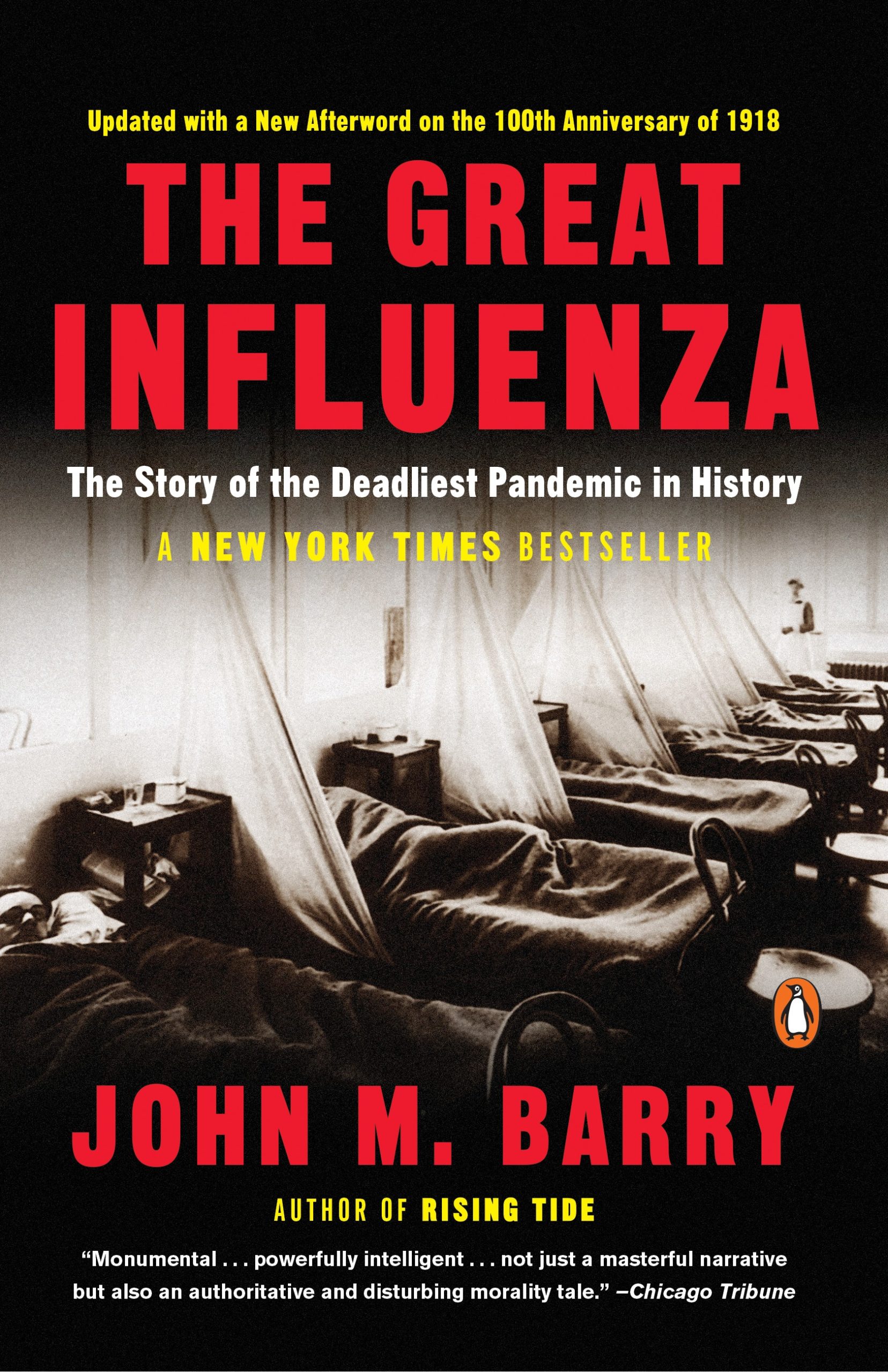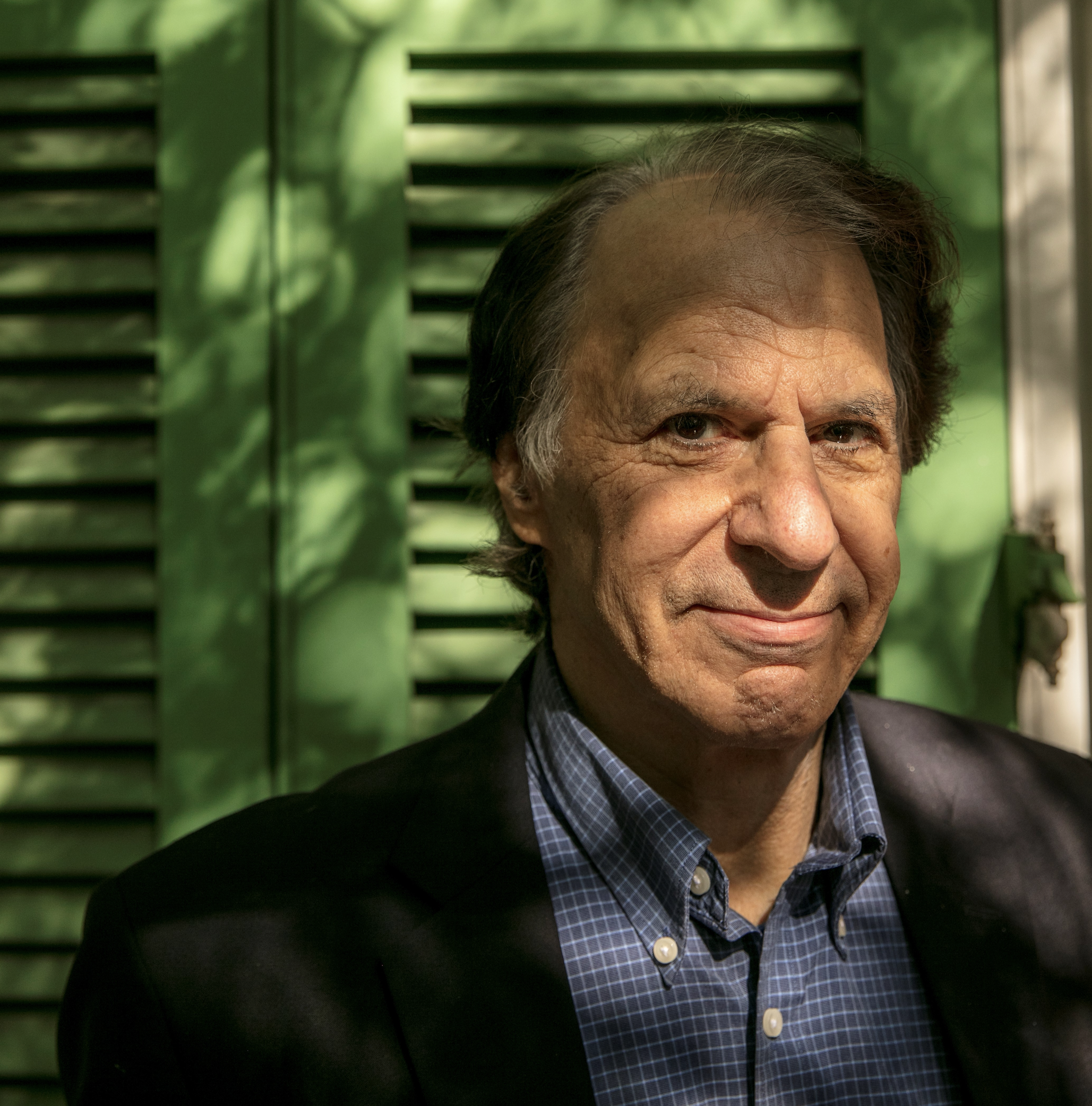A Conversation with John Barry
It’s not often that a book becomes a #1 New York Times bestseller 15 years after being published, but that’s what happened earlier this spring to a book written by historian John Barry that was first published in 2005.
Called “The Great Influenza: The Story of the Deadliest Pandemic in History,” it is an account of the deadly virus that swept across America and the world in the winter of 1918, killing more people in 24 weeks than AIDS killed in 24 years, and more in a year than the Black Death killed in a century.
In total, as many as 100 million people died around the globe, succumbing to a horrifying disease that not only often left its victims bleeding from their eyes, ears, noses, and mouths, but also saw them turn a ghastly shade of dark blue because of the oxygen that was being stolen from their blood.
The outbreak occurred in the waning months of World War I, and the story Barry tells is of a country focused on one conflict and consumed by another. Caught off guard and unprepared for the pandemic, America’s leaders at first deny its existence and then downplay its severity, lest the Great Influenza get in the way of the effort to win the Great War. President Woodrow Wilson never mentions the disease in any of his public statements, and cities and towns across the country are left to fend for themselves.
When Barry’s book was released, then-President George W. Bush was so affected by it that he launched an unprecedented three-year effort to prepare the country for the next outbreak. “A pandemic is a lot like a forest fire,” he said at the time. “If caught early it might be extinguished with limited damage. If allowed to smolder, undetected, it can grow to an inferno that can spread quickly beyond our ability to control it.”
As the United States continues its battle against COVID-19 and tries to contain the same type of viral inferno that President Bush talked about, the Forum spoke with John Barry about the great influenza pandemic that paralyzed our country 102 years ago and the lessons it holds for today.
____________________________
Forum: As we head into the fall, would you say the U.S. response to the coronavirus pandemic of 2020 has been better or worse than the U.S. response to the great influenza pandemic of 1918?
Barry: I’d say it’s been much worse. The reason is that in 1918, they really were caught by surprise. Obviously, science was not then where it is now, and we were in the middle of a war.
Today, we had ample warning, many, many more tools to use, a lot of planning, and a lot of preparation — all of which were pretty much thrown out the window. So I would say it’s much worse this time around.
The amazing thing about the whole process is that the world has demonstrated the ability to control this outbreak through public health measures to an extent that I would never have imagined before this event occurred.
Forum: Based on America’s response so far, what do you expect this fall to look like with regard to the spread of COVID-19? Will things get better for the country or do you expect things will get worse?
Barry: The virus is actually relatively easy to predict. What you can’t really predict is human behavior. We’ve seen an ebb and flow here. Things will get bad in an area of the country, and people will take it very seriously, and it will get a lot better. Then they may relax or some other area doesn’t pay attention, and it gets bad there.
My expectation would be — depending on when the weather gets cold and people start going inside more — that things will get worse. If people behave properly, it is possible that the case counts will get lower. That would be wonderful. I don’t think that will happen, but it is certainly a possibility.
“The virus is actually relatively easy to predict. What you can’t really predict is human behavior.”
The amazing thing about the whole process is that the world has demonstrated the ability to control this outbreak through public health measures to an extent that I would never have imagined before this event occurred.
Forum: Talk for a moment about the importance of communications. Americans are more connected and have more information at their fingertips than ever before. How has the wealth and immediacy of information we have today impacted how people view the pandemic, particularly when compared to 1918?
Barry: As you say, the information is available. The question is, what source are you going to rely on? The biggest problem in this regard, of course, is Donald Trump. The irony is that if he had taken charge of this aggressively, I think he’d be in a very, very strong position for re-election. The only time his approval ratings cracked 50% was a few days after he said we were at war with the virus. People rally around a leader.
In Germany, Merkel’s approval rating hit 77%. She had terrible ratings before the pandemic struck. But she was straightforward and assertive and honest in her handling of the pandemic, and her approval skyrocketed. Incidentally, the German economy is in infinitely greater shape than the American economy because they got control of the virus. Of course, Merkel is not the only one who told the truth from the beginning and also got control of the virus. Many, many countries around the world did that. That was not the case in the United States.
For whatever bizarre reason, Trump saw this virus as a personal attack and responded as if it were a political enemy, first disparaging it as weak as he disparages all his enemies. Briefly, he would act like he took it seriously, but then he would step on his own lines. The result is that advice which public health experts unanimously agreed with was politicized. That’s quite an accomplishment, to politicize something like wearing a mask — and not a good one, not one to be proud of.
Forum: How about the media? In your book, you write about how the media did not report on the severity of the outbreak in 1918. How is the press doing today?
Barry: In 1918, they had an excuse – we were at war. There was a context that was very important. [President] Wilson did everything within his power to gin up patriotic fervor. It was quite successful. And the press engaged in self-censorship. In other warring countries, there was outright censorship on both sides. The U.S. had very effective self-censorship, which was helped along by a law that Wilson enacted which made it punishable by 20 years in prison to write, print, or publish any disloyal, scurrilous, profane, or abusive language about the government of the United States. They actually prosecuted a Congressman and sentenced him to 10 years in prison under that law. When the pandemic started and one newspaper was actually telling the truth, the Army started prosecution proceedings against the editor and publisher, although they dropped it as the pandemic proceeded. So the newspapers were part of the patriotic fervor.
This time around, I think most of the press, with the exception of Fox, has done a very good job in trying to get the truth out to people on the pandemic. You look at CNN and Sanjay Gupta was on there every night for an extended period of time answering people’s questions and giving people very good information. The national newspapers — the Post and the Times — have done an outstanding job, I think.
In most crises, at least in my lifetime in fact, the press has risen to a very high standard. I look back at September 11th, for example, and think the press then, both TV and print, worked really hard to get real information and good information out.
I think Fox has decided to play a different game, unfortunately.
Forum: Talk briefly about how the influenza pandemic of 1918 came to an end. Was a vaccine found? Did herd immunity develop? Or was it a combination of both?
Barry: There was no vaccine. They didn’t even know what a virus was. They knew that there were very, very small pathogens, which could pass through the smallest filter they had and they referred to as filterable viruses. They didn’t know if they were just really, really small bacteria or different kinds of organisms. Part of the progress in science that came out of the pandemic was defining what a virus was. They did develop several vaccines against bacterial pneumonias, which if you happened to get sick and you had a pneumonia caused by a particular bacteria targeted by a vaccine you got, it might have some effect.
“For whatever bizarre reason, Trump saw this virus as a personal attack and responded as if it were a political enemy.”
What really happened was, in my view, two things. Number one, the influenza virus mutates very, very rapidly, much faster than COVID-19 — or I should say SARS-CoV-2. And my guess is that the virus mutated in the direction of mildness, which is the case for most influenza viruses. At the same time, by the second or third time that people began to see the virus, their immune systems were much better able to deal with it. It’s quite common when a new pathogen enters a population, it wreaks havoc. This occurs whether it was the introduction of smallpox, measles, or influenza into the New World in the 17th century, where these diseases wiped out Americans at much higher rates than they killed Europeans; or whether it was in 1918, when in isolated populations which had never seen any influenza virus at all and 20 to 30% of the entire population die. So, number one, I think the virus itself changed, and number two, people were better able to deal with it when their immune systems saw it again.
Forum: Looking ahead, how do you think the coronavirus pandemic will come to an end and when do you think that will occur?
Barry: Well, I think number one, this virus is going to be with us forever. It will be a new human disease. When we get an effective vaccine, then we can probably get back to something akin to normal. Nobody knows how long immunity will last. It remains an open question how much exposure you need to develop immunity. There are now cases of people who seem to have been infected twice. But when you have millions of cases, that’s not really unusual. It doesn’t necessarily mean that immunity will not be long-lasting or at least lasting after exposure or vaccination. People respond differently to stimuli, whether it’s a pathogen, a vaccine, or any kind of drug. If the vaccine is pretty good, then it comes down to how long it will take before it’s widely distributed. I would guess that the earliest would be late spring of 2021.
I know that there’s been some recent modeling on herd immunity that suggests as little as 43% of the population needs to be infected to significantly cut down transmission. That would be great if that were the truth — or I should say correct, since truth is a loaded term. That would be great if that were correct. But there are some recent studies in prisons that suggest that is not the case, and that you need a much higher percentage of the population to be infected before you slowed down transmission. You know, 60 to 65% — which was actually the original modeling estimate of Marc Lipsitch at Harvard and some other people. And herd immunity is not immunity. This disease is not going away. It will continue to circulate.
Forum: So we’ve still got a lot more to learn about it, and we’ve still got a long way to go. That’s sounds like what you’re saying.
Barry: Absolutely.






